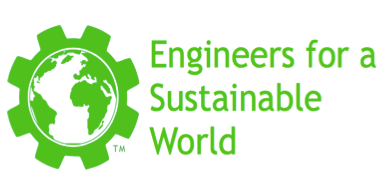By Alexander Dale, Education Director, Engineers for a Sustainable World (This article appears in the March, 2013 issue of The ACUPCC Implementer)
 Engineers for a Sustainable World (ESW) is a non-profit network dedicated to creating solutions to local and global sustainability challenges. Established in 2002, ESW is comprised of students, university faculty, and professionals dedicated to forging lasting solutions to local and global sustainability challenges. ESW mobilizes members through educational programs, sustainability-oriented design projects, and a national community that fosters practical and innovative solutions while helping to create the next generation of technical leaders.
Engineers for a Sustainable World (ESW) is a non-profit network dedicated to creating solutions to local and global sustainability challenges. Established in 2002, ESW is comprised of students, university faculty, and professionals dedicated to forging lasting solutions to local and global sustainability challenges. ESW mobilizes members through educational programs, sustainability-oriented design projects, and a national community that fosters practical and innovative solutions while helping to create the next generation of technical leaders.
Today ESW has chapters at 32 universities across the US, with a network of over 1,000 current members, and 2,500 alumni. Chapters  are guided by a national team, and work on a variety of projects both on and off campus to address the issues of climate change, and clean energy. For example, this year ESW-Cornell is partnering with the Ithaca Wastewater Treatment Plant to design and build a waste oil, and biodiesel facility in the waste water treatment plant. Student members will be working with the plant to collect information, conduct research, and implement their design in the facility, with the hope that it will be used as a central fueling station for community members. Several other ESW chapters are also currently involved in biofuel generation projects both on, and off campus. ESW-UCSD members have designed a biogas digester to provide cooking fuel in the form of methane gas to families in Thailand that have traditionally relied on wood fuel. Replacing wood with biogas can reduce deforestation, reduce greenhouse gas emissions, and improve air quality in homes, leading to improved respiratory health. ESW students at Georgia Tech are working with university professors to conduct research on the viability of biofuels generated by algae for the aviation industry.
are guided by a national team, and work on a variety of projects both on and off campus to address the issues of climate change, and clean energy. For example, this year ESW-Cornell is partnering with the Ithaca Wastewater Treatment Plant to design and build a waste oil, and biodiesel facility in the waste water treatment plant. Student members will be working with the plant to collect information, conduct research, and implement their design in the facility, with the hope that it will be used as a central fueling station for community members. Several other ESW chapters are also currently involved in biofuel generation projects both on, and off campus. ESW-UCSD members have designed a biogas digester to provide cooking fuel in the form of methane gas to families in Thailand that have traditionally relied on wood fuel. Replacing wood with biogas can reduce deforestation, reduce greenhouse gas emissions, and improve air quality in homes, leading to improved respiratory health. ESW students at Georgia Tech are working with university professors to conduct research on the viability of biofuels generated by algae for the aviation industry.
Although our chapters work primarily on independent projects, ESW also conducts multi-chapter project initiatives. Over the 2011-2012 academic year, with the support of Autodesk and SunEdison, ESW awarded nine chapters funding for projects around ‘Innovative Application of a Solar-Powered Kiosk’ and ‘Innovative Renewable Microgrid Applications’. The University of Buffalo’s solar smoothie cart project uses energy from a solar panel to power blenders for making fresh fruit smoothies. Smoothies are sold at on-campus events, with all money earned from sales going towards the chapters other ESW projects. Ohio State University carried out a similar project, working with a professional chef that manages a café on campus to construct a food cart with a box fridge, and blenders powered by a solar panel. For 2013, ESW chapters will be using life-cycle assessment software from Sustainable Minds to identify improvements to on-campus systems through our Life-Cycle Assessment + Universities (LCA+U) initiative.
In addition to learning through project participation, ESW members also have access to a variety of resources provided by the national team. Monthly skills and training webinars on topics such as life cycle assessment and construction techniques, as well as informational webinars on topics like biodiversity, design for repair, and urban responses to climate changeare available to all ESW members. Students also have the chance to interact with other chapters and attend presentations on a wide variety of sustainability related topics at ESW’s annual conferences, held at a different university each year.
To expand upon our educational outreach efforts, in the fall of 2013, Georgia Tech, Rochester Institute of Technology, and the University of Pittsburgh will be piloting a new course initiative, dedicated to addressing Wicked Problems in Sustainable Engineering (WPSE). The course will give students the opportunity to wrestle with an unstructured problem - the same at all schools - through local multi-disciplinary teams and asynchronous digital lectures from industry professionals. Final reports from all schools will be presented at the 2014 ESW Conference.
ESW is always looking to expand our network and share more ideas. For more information on Engineers for a Sustainable World, and to learn how to getinvolved, visit www.eswusa.org or email info@eswusa.org.
